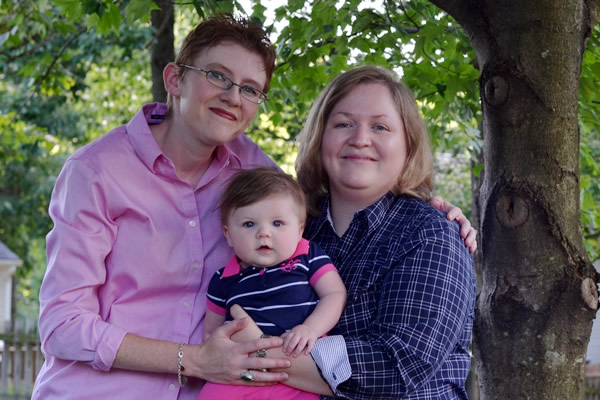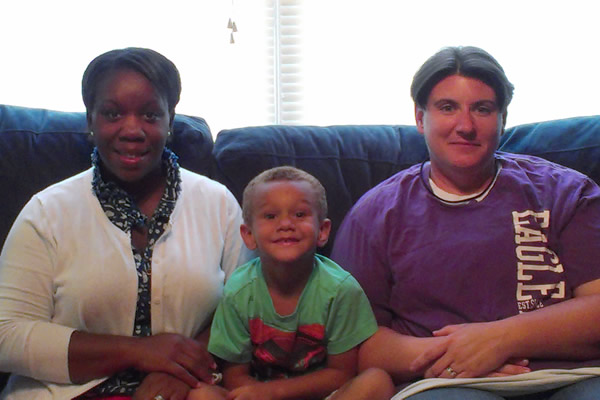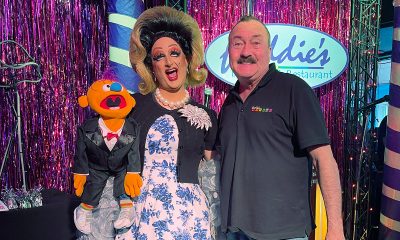News
Va. lesbian couples file lawsuit seeking marriage rights
ACLU, Lambda Legal seek to overturn 2006 constitutional ban
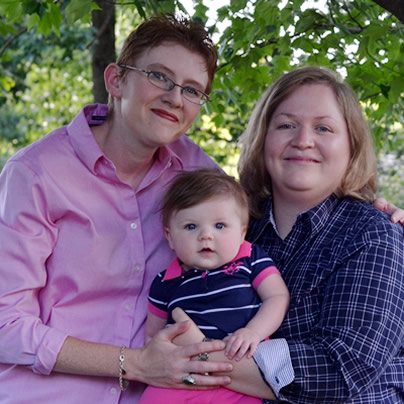
The American Civil Liberties Union and Lambda Legal on Thursday filed a federal lawsuit on behalf of two lesbian couples who are challenging Virginia’s gay nuptials ban and the commonwealth’s refusal to recognize same-sex marriages legally performed in other states.
Joanne Harris and Jessica Duff of Staunton, who have been together for more than nine years and are raising a 4-year-old son, tried to apply for a marriage license in Staunton Circuit Court on July 29. Christy Berghoff and Victoria Kidd of Winchester, who have been together for more than nine years and are raising an 8-month-old daughter, married in D.C. in August 2011.
“I’m an Air Force veteran, and if Virginia would just respect our marriage from D.C., it would ensure that my spouse and family could access all the benefits I’ve earned,” Berghoff, who works for the U.S. Justice Department. “I’ve been with Victoria for almost a decade now; and it hurts to have our home state say we are not married when it recognizes marriages entered into by different-sex couples who may have only recently met.”
The ACLU and Lambda Legal filed the lawsuit against the commonwealth’s same-sex marriage ban that voters approved in 2006 slightly more than a month after the U.S. Supreme Court found a portion of the Defense of Marriage Act unconstitutional and struck down California’s Proposition 8.
A gay couple from Norfolk last month filed a separate federal lawsuit that challenges Virginia’s same-sex marriage ban.
Neighboring Maryland is among the 13 states and D.C. in which same-sex couples can marry. The federal government also recognizes the marriages of gays and lesbians who legally tied the knot, although their ability to receive Social Security and other federal benefits depends upon whether the state in which they live will recognize their unions.
“It seems contrary to the rights and liberties guaranteed to us by our Constitution, that a trip across the Potomac River, an arbitrary geographical line would somehow grant or deny any citizen equal treatment under the law,” said James Parrish, executive director of Equality Virginia.
A Quinnipiac University poll released on July 18 noted 50 percent of Virginians support same-sex marriage. A survey that Public Policy Polling unveiled a week before found 55 percent of commonwealth residents back nuptials for gays and lesbians.
State Sen. Adam Ebbin (D-Alexandria) said in a statement he knows of “too many couples” who have moved out of the commonwealth because of “a lack of protections now offered to our neighbors in the District of Columbia and Maryland.”
“With a total of 13 states and D.C. offering equality to couples, Virginia is at a competitive and economic disadvantage,” Ebbin said. “After all, forward thinking companies of all sizes locate where their diverse workforces will enjoy a high quality of life.”
Tucker Martin, a spokesperson for Gov. Bob McDonnell, who is named as a defendant in the lawsuit filed in U.S. District Court for the Western Division of Virginia in Harrisonburg, defended Virginia’s same-sex marriage ban in a statement to the Washington Blade.
“The voters of Virginia passed a constitutional amendment in 2006 defining marriage in the commonwealth as being only a union of one man and one woman,” Martin said. “It is the law in this state based on the popular will of the voters as expressed at the ballot box.”
Attorney General Ken Cuccinelli’s office declined to comment on the lawsuit, although spokesperson Brian Gottstein referred to a statement he released after the Supreme Court issued its DOMA and Prop 8 rulings.
“Virginia has followed the traditional definition of marriage as being between one man and one woman for more than 400 years,” Cuccinelli said in a June 26 statement on the justices’ rulings. “Virginians voted overwhelmingly to add this traditional definition to their constitution.”
Cuccinelli, who will face off against former Democratic National Committee Chair Terry McAuliffe in the commonwealth’s gubernatorial election, highlighted his opposition to same-sex marriage last month during a debate at the Homestead in Hot Springs. GOP lieutenant gubernatorial candidate E.W. Jackson and Mark Obenshein, who is running to succeed Cuccinelli as attorney general, also oppose nuptials for gays and lesbians.
McAuliffe in February publicly backed same-sex marriage. State Sens. Ralph Northam (D-Norfolk) and Mark Herring (D-Loudoun,) who are running for lieutenant governor and attorney general respectively, also support the issue.
Politics
Smithsonian staff concerned about future of LGBTQ programming amid GOP scrutiny
Secretary Lonnie Bunch says ‘LGBTQ+ content is welcome’

Staff at the Smithsonian Institution are concerned about the future of LGBTQ programming as several events featuring a drag performer were cancelled or postponed following scrutiny by House Republicans, according to emails reviewed by the Washington Post.
In December, Secretary Lonnie G. Bunch III appeared before a hearing led by GOP members of the Committee on House Administration, who flagged concerns about the Smithsonian’s involvement in “the Left’s indoctrination of our children.”
Under questioning from U.S. Rep. Stephanie Bice (R-Okla.), Bunch said he was “surprised” to learn the Smithsonian had hosted six drag events over the past three years, telling the lawmakers “It’s not appropriate to expose children” to these performances.
Collaborations with drag artist Pattie Gonia in December, January, and March were subsequently postponed or cancelled, the Post reported on Saturday, adding that a Smithsonian spokesperson blamed “budgetary constraints and other resource issues” and the museums are still developing programming for Pride month in June.
“I, along with all senior leaders, take seriously the concerns expressed by staff and will continue to do so,” Bunch said in a statement to the paper. “As we have reiterated, LGBTQ+ content is welcome at the Smithsonian.”
The secretary sent an email on Friday expressing plans to meet with leaders of the Smithsonian Pride Alliance, one of the two groups that detailed their concerns to him following December’s hearing.
Bunch told the Pride Alliance in January that with his response to Bice’s question, his intention was to “immediately stress that the Smithsonian does not expose children to inappropriate content.”
“A hearing setting does not give you ample time to expand,” he said, adding that with more time he would have spoken “more broadly about the merits and goals of our programming and content development and how we equip parents to make choices about what content their children experience.”
Africa
Upcoming Ugandan Census will not count intersex people
Advocacy group report documents rampant discrimination, marginalization

Uganda’s national Census next month will not count intersex people.
The revelation about the exclusion of intersex Ugandans in the 9-day Census exercise that will begin on May 10 has been confirmed to the Washington Blade by the head of Uganda’s Bureau of Statistics.
UBOS Executive Director Chris Mukiza in response to the Blade’s questions on the issue said the agency has “no business with intersex.”
Their counting could have made Uganda the second African country and the third globally after Australia and Kenya to collect an intersex person’s data in a Census.
Kenya’s 2019 Census determined there were more than 1,500 intersex people in the country.
Uganda had a population of 34.8 million, according to the country’s last Census that took place in 2014.
Intersex people in Uganda are among marginalized groups, subject to stigma and discrimination. The government has yet to recognize them as the third sex and consider them among other minority groups, such as people with disabilities, who enjoy special treatment.
Intersex people cannot be exclusively categorized as male or female for having a biological congenital condition with unique sex characteristics due to inherent and mixed anatomical, hormonal, gonadal, or chromosomal patterns that could be apparent before, at birth, in childhood, puberty, or adulthood.
Mukiza’s position of excluding intersex people in the Census, however, comes amid the prime minister’s office’s demands for inclusivity and equality for all the population. (The Constitutional Court on April 3 refused to “nullify the Anti-Homosexuality Act in its totality.”)
“We recognize that much work remains to be done particularly in addressing the needs of the marginalized and vulnerable communities, promoting inclusive economic growth, and combating climate change,” said Dunstan Balaba, the permanent secretary in the prime minister’s office.
Balaba spoke on April 18 during the National Population and Housing Census prayer breakfast meeting the UBOS convened. Religious leaders and other stakeholders attended it.
President Yoweri Museveni has noted that data from the country’s sixth national Census will be crucial towards achieving the nation’s Vision 2040 and help the government, non-governmental organizations, and donors in providing services to the diverse population.
“It will also provide the basis for planning the provision of social services such as education, health, and transport, among others at the national and local level,” Museveni said as he urged citizens to fully support the Census and provide accurate information.
Uganda has an intersex rights organization, “Support Initiative for People with Atypical Sex Development (SIPD),” which activist Julius Kaggwa founded in 2008 with the support of groups that advocate for children, women, and other marginalized populations.
Some of SIPD’s work as a non-profit, grassroots organization includes community outreach and engagement, sharing reliable information with the society for the protection of intersex people’s rights, and championing the need for organized medical and psychological support.
The organization, through its numerous reports, has decried human rights violations against intersex people that include surgery without consent, discrimination in homes, schools and medical centers, parents abandoning intersex children, and stigma due to lack of legal protection by the government.
Uganda’s Registration of Births and Deaths Act allows a parent or guardian of a child under the age of 21 to change the name or sex at the local registration office. The SIPD, however, maintains this law is discriminatory to intersex people over 21 who want to change their sex characteristics, and want parliament to repeal it.
The intersex rights organization wants the Health Ministry to establish a central registry to register intersex children after they’re born in order to receive support in terms of healthcare, social and legal by the government and other stakeholders as they grow up.
SIPD particularly wants the government to enact a policy that would allow a gender-neutral marker on birth certificates for intersex children to ease any change of sex in the future. The organization also wants the government, through the Education Ministry, to adopt a curriculum that also considers intersex issues in schools and creates a friendly environment for intersex children to learn and graduate like their non-intersex peers.
These demands follow SIPD’s findings that disclosed many intersex children were dropping out of school because of the stigma and discrimination they suffered. The organization has further called on the public-funded Uganda Human Rights Commission to live up to its constitutional mandates of defending human rights by leading the promotion and protection of the rights of intersex people across the country.
SIPD has also challenged religious leaders, who play a key role in Ugandan society and are influential at the local and national level, to promote acceptance of intersex people and to end discrimination against them.
District of Columbia
Three of five LGBTQ candidates win race for DNC delegate from D.C.
32 candidates competed for 13 elected seats in party caucus
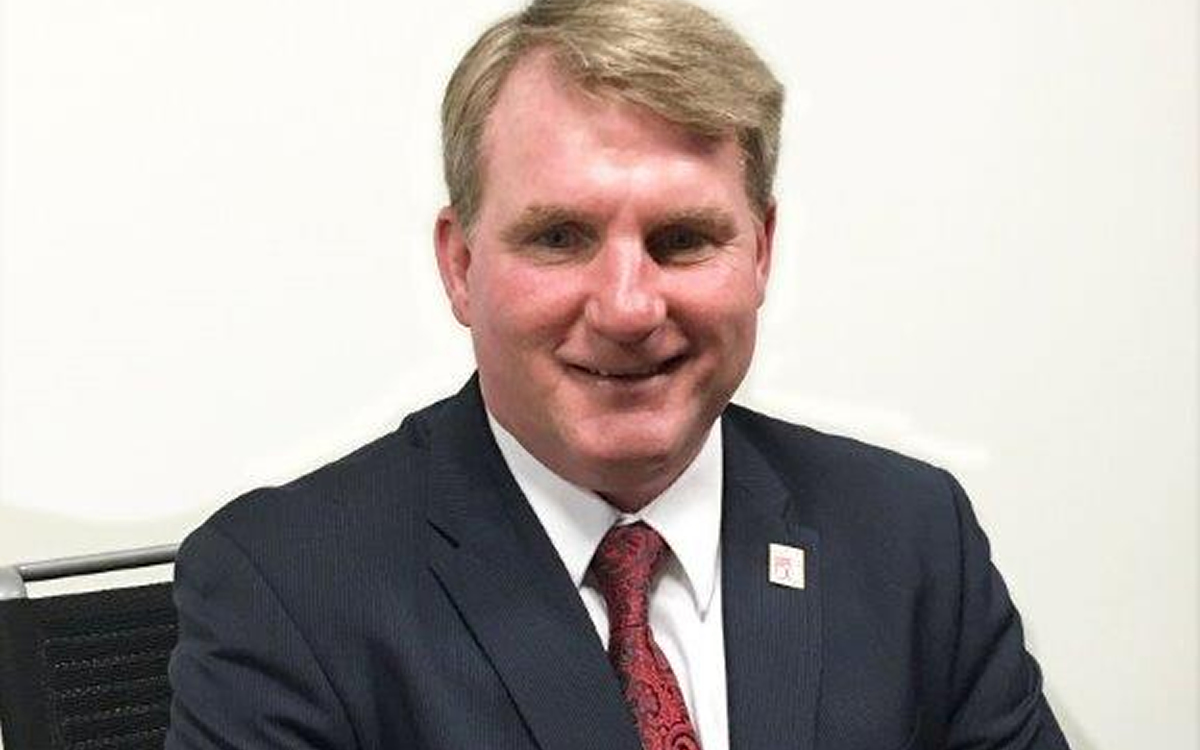
Three out of five known LGBTQ candidates running for election as delegates from D.C. to the Democratic National Convention won their races at an April 20 Democratic Party caucus election held at D.C.’s Walter Washington Convention Center.
Ward 2 gay Democratic activist John Fanning finished in first place with 140 votes and Ward 8 gay Democratic activist David Meadows finished in second place with 127 votes in a race in which six male candidates committed to supporting President Biden were competing for three male seats in a section of the city designated as Congressional District 1, which included registered Democratic voters in Wards 1, 2, 6, and 8.
Ward 7 gay Democratic activist Jimmie Williams won his race, finishing in third place with 200 votes in a race in which eight male candidates committed to President Biden competed for four male seats in the Congressional District 2 section of the city that included Wards 3, 4, 5, and 7.
Gay Democratic activist Felipe Afanador lost his race, finishing in sixth place with 47 votes in the Congressional District 2 election for male candidates backing Biden. It couldn’t immediately be determined which of the four wards in District 2 he is from.
The Washington Blade didn’t learn about Afanador’s status as an LGBTQ candidate until the Capital Stonewall Democrats announced it one day before the April 20 party election in an email statement.
In the Congressional District 2 race among female candidates, in which eight candidates competed for three female seats, transgender rights advocate and Ward 3 Democratic Party activist Monika Nemeth lost her race, finishing in sixth place with 49 votes.
The five LGBTQ candidates were among 32 candidates competing for just 13 elected delegate positions in D.C. D.C. will have a total of 51 delegates to the Democratic Convention, but the other 38 include elected officials and party leaders who are considered “automatic” or appointed delegates. The Democratic Convention will be held in Chicago Aug. 19-23.
Observers familiar with the April 20 party caucus election said Fanning, Meadows, and Williams had participated in local D.C. Democratic Party events and activities for a longer period than Nemeth and Afanador and appear to have been better known among Democratic voters in their respective wards as well as other wards. Those factors contributed to their receiving significantly more votes than most other candidates, observers have said.
In his candidacy statement posted on the D.C. Democratic Party website, Afanador said he worked on the 2020 Biden presidential election campaign in Pennsylvania. His LinkedIn page says in 2022 he began work in Washington for the Biden administration as an official in the U.S. Department of Agriculture.
Nemeth is a past president of D.C.’s Capital Stonewall Democrats, the city’s largest LGBTQ local political group, and has been an active member of the D.C. Democratic State Committee, the local party governing body. She served as a Biden delegate at the 2020 Democratic National Convention.
“It is important for our D.C. delegation to have strong LGBTQ representation,” Capital Stonewall Democrats said in its April 19 statement. “There are five LGBQ candidates running to be delegate, and Capital Stonewall Democrats asks that our members support each one,” the statement says.
“Unfortunately, they fell short, but they and all queer Democrats are welcome to attend and participate in convention events and activities sponsored by the national and local party,” Meadows told the Blade in referring to Nemeth and Afanador. “Our shared goal is to unite behind the Biden-Harris ticket to protect our LGBTQ rights from being dismantled by Donald Trump and the GOP,” Meadows said.
“Running for District Delegate is one of the most grassroots efforts,” Fanning told the Blade. “It’s very beneficial to align yourself on a slate with community leaders that have either previously run for District Delegate or have developed a constituency in their community from other civic engagements,” he said, referring to possible reasons for his, Meadows, and Williams’s election victory.
Aside from the D.C. elected LGBTQ delegates, two prominent D.C. LGBTQ Democratic leaders will be appointed as delegates to the 2024 Democratic National Convention in their role as members of the Democratic National Committee from D.C. They are Claire Lucas, a highly acclaimed Democratic Party and LGBTQ rights advocate and party fundraiser; and Earl Fowlkes, one of the lead organizers of D.C.’s annual Black LGBTQ Pride celebration and former president of the Capital Stonewall Democrats. Both are committed to supporting President Biden as the Democratic nominee for re-election.
-

 District of Columbia5 days ago
District of Columbia5 days agoNew D.C. LGBTQ+ bar Crush set to open April 19
-

 District of Columbia5 days ago
District of Columbia5 days agoReenactment of first gay rights picket at White House draws interest of tourists
-

 Arizona5 days ago
Arizona5 days agoAriz. governor vetoes anti-transgender, Ten Commandments bill
-

 South America3 days ago
South America3 days agoDaniel Zamudio murderer’s parole request denied

